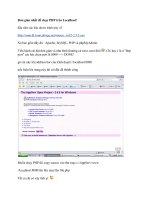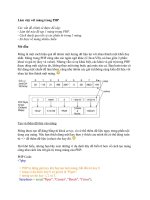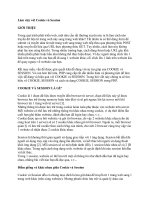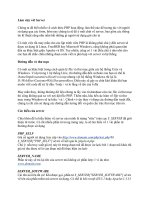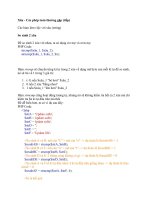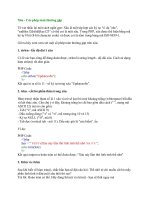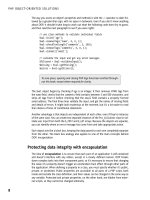Tài liệu PHP Tutorial chương 2 p2 docx
Bạn đang xem bản rút gọn của tài liệu. Xem và tải ngay bản đầy đủ của tài liệu tại đây (100.53 KB, 3 trang )
PHP Cheat Sheet
Function List
Probably the biggest problem with PHP is its inconsistency. Some function names use
underscores, some don't. Some are of the form "verb object" and some are "object verb".
Some use "2" instead of "to". The side sections of the cheat sheet list many of the most
commonly used functions in PHP and are there to provide a quick reference to check
function names.
SuperGlobals
In PHP, SuperGlobals are available at any point in a script, and allow access to data from
the user and session date, as well as information about server settings and environmental
data. This section contains a list of SuperGlobal variable names.
Date Formatting
There are, as I'm sure you are aware, a huge number of options when it comes to date
formatting, and there are few people who remember all of them. This section of the cheat
sheet lists the various options, followed by a description, and an example where
appropriate.
Regular Expression Syntax
Many people have trouble with regular expressions, and the first step to coming to grips
with them is to become familiar with the various symbols used in regular expressions and
their meaning. This section lists these symbols and describes their meaning.
PCRE Modifiers
"PCRE" stands for "Perl Compatible Regular Expressions". In PHP, this refers to
functions like "preg_replace" and "preg_split". The patterns used in these functions can
have modifiers applied to them, and this section list those modifiers and what they do.
Function Argument Orders
One of the other major inconsistencies in PHP is function argument ordering. Functions
that are very very similar often completely opposite ordering of arguments. This section
simply lists a few of the common ones people are sometimes confused by, or that people
find easy to forget.
fopen() Modes
fopen() is a widely used function and has several modes in which it can operate,
depending on whether you want to read or write to a file, and what you want to do with
data already in that file. This section lists those modes and what each does.
One.N(UDS)

